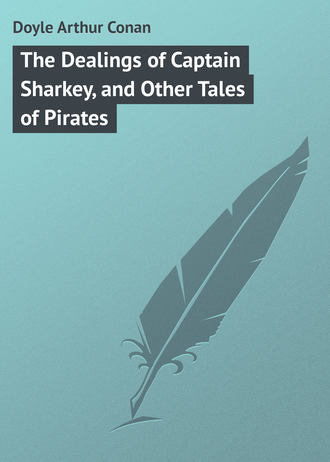
Артур Конан Дойл
The Dealings of Captain Sharkey, and Other Tales of Pirates
Old Patterson, the oldest man of my crew, and as steady as the Pyramids, had been stationed in the bows with a boat-hook to fend off the drifting logs which came sweeping down with the current. Now he stood with crooked knees, glaring out in front of him, and one forefinger stabbing furiously at the air.
"Look at it!" he yelled. "Look at it!"
And at the same instant we saw it.
A huge black trunk was coming down the river, its broad glistening back just lapped by the water. And in front of it – about three feet in front – arching upwards like the figure-head of a ship, there hung a dreadful face, swaying slowly from side to side. It was flattened, malignant, as large as a small beer-barrel, of a faded fungoid colour, but the neck which supported it was mottled with a dull yellow and black As it flew past the Gamecock in the swirl of the waters I saw two immense coils roll up out of some great hollow in the tree, and the villainous head rose suddenly to the height of eight or ten feet, looking with dull, skin-covered eyes at the yacht. An instant later the tree had shot past us and was plunging with its horrible passenger towards the Atlantic.
"What was it?" I cried.
"It is our fiend of the cooperage," said Dr. Severall, and he had become in an instant the same bluff, self-confident man that he had been before. "Yes, that is the devil who has been haunting our island. It is the great python of the Gaboon."
I thought of the stories which I had heard all down the coast of the monstrous constrictors of the interior, of their periodical appetite, and of the murderous effects of their deadly squeeze. Then it all took shape in my mind. There had been a freshet the week before. It had brought down this huge hollow tree with its hideous occupant. Who knows from what far distant tropical forest it may have come! It had been stranded on the little east bay of the island. The cooperage had been the nearest house. Twice with the return of its appetite it had carried off the watchman. Last night it had doubtless come again, when Severall had thought he saw something move at the window, but our lights had driven it away. It had writhed onwards and had slain poor Walker in his sleep.
"Why did it not carry him off?" I asked.
"The thunder and lightning must have scared the brute away. There's your steward, Meldrum. The sooner we have breakfast and get back to the island the better, or some of those niggers might think that we had been frightened."
X
JELLAND'S VOYAGE
"Well," said our Anglo-Jap as we all drew up our chairs round the smoking-room fire, "it's an old tale out yonder, and may have spilt over into print for all I know. I don't want to turn this club-room into a chestnut stall, but it is a long way to the Yellow Sea, and it is just as likely that none of you have ever heard of the yawl Matilda, and of what happened to Henry Jelland and Willy McEvoy aboard of her.
"The middle of the sixties was a stirring time out in Japan. That was just after the Simonosaki bombardment, and before the Daimio affair. There was a Tory party and there was a Liberal party among the natives, and the question that they were wrangling over was whether the throats of the foreigners should be cut or not. I tell you all, politics have been tame to me since then. If you lived in a treaty port, you were bound to wake up and take an interest in them. And to make it better, the outsider had no way of knowing how the game was going. If the opposition won it would not be a newspaper paragraph that would tell him of it, but a good old Tory in a suit of chain mail, with a sword in each hand, would drop in and let him know all about it in a single upper cut.
"Of course it makes men reckless when they are living on the edge of a volcano like that. Just at first they are very jumpy, and then there comes a time when they learn to enjoy life while they have it. I tell you there's nothing makes life so beautiful as when the shadow of death begins to fall across it. Time is too precious to be dawdled away then, and a man lives every minute of it. That was the way with us in Yokohama. There were many European places of business which had to go on running, and the men who worked them made the place lively for seven nights in the week.
"One of the heads of the European colony was Randolph Moore, the big export merchant. His offices were in Yokohama, but he spent a good deal of his time at his house up in Jeddo, which had only just been opened to the trade. In his absence he used to leave his affairs in the hands of his head clerk, Jelland, whom he knew to be a man of great energy and resolution. But energy and resolution are two-edged things, you know, and when they are used against you you don't appreciate them so much.
"It was gambling that set Jelland wrong. He was a little dark-eyed fellow with black curly hair – more than three-quarters Celt, I should imagine. Every night in the week you would see him in the same place, on the left-hand side of the croupier at Matheson's rouge et noir table. For a long time he won, and lived in better style than his employer. And then came a turn of luck, and he began to lose so that at the end of a single week his partner and he were stone broke, without a dollar to their names.
"This partner was a clerk in the employ of the same firm – a tall, straw-haired young Englishman called McEvoy. He was a good boy enough at the start, but he was clay in the hands of Jelland, who fashioned him into a kind of weak model of himself. They were for ever on the prowl together, but it was Jelland who led and McEvoy who followed. Lynch and I and one or two others tried to show the youngster that he could come to no good along that line, and when we were talking to him we could win him round easily enough, but five minutes of Jelland would swing him back again. It may have been animal magnetism or what you like, but the little man could pull the big one along like a sixty-foot tug in front of a full-rigged ship. Even when they had lost all their money they would still take their places at the table and look on with shining eyes when any one else was raking in the stamps.
"But one evening they could keep out of it no longer. Red had turned up sixteen times running, and it was more than Jelland could bear. He whispered to McEvoy, and then said a word to the croupier.
"'Certainly, Mr. Jelland; your cheque is as good as notes,' said he.
"Jelland scribbled a cheque and threw it on the black. The card was the king of hearts, and the croupier raked in the little bit of paper. Jelland grew angry, and McEvoy white. Another and a heavier cheque was written and thrown on the table. The card was the nine of diamonds. McEvoy leaned his head upon his hands and looked as if he would faint. 'By God!' growled Jelland, 'I won't be beat,' and he threw on a cheque that covered the other two. The card was the deuce of hearts. A few minutes later they were walking down the Bund, with the cool night-air playing upon their fevered faces.
"'Of course you know what this means,' said Jelland, lighting a cheroot; 'we'll have to transfer some of the office money to our current account. There's no occasion to make a fuss over it. Old Moore won't look over the books before Easter. If we have any luck, we can easily replace it before then.'
"'But if we have no luck?' faltered McEvoy.
"'Tut, man, we must take things as they come. You stick to me, and I'll stick to you, and we'll pull through together. You shall sign the cheques to-morrow night, and we shall see if your luck is better than mine.'
"But if anything it was worse. When the pair rose from the table on the following evening, they had spent over £5,000 of their employer's money. But the resolute Jelland was as sanguine as ever.
"'We have a good nine weeks before us before the books will be examined,' said he. 'We must play the game out, and it will all come straight.'
"McEvoy returned to his rooms that night in an agony of shame and remorse. When he was with Jelland he borrowed strength from him; but alone he recognised the full danger of his position, and the vision of his old white-capped mother in England, who had been so proud when he had received his appointment, rose up before him to fill him with loathing and madness. He was still tossing upon his sleepless couch when his Japanese servant entered the bedroom. For an instant McEvoy thought that the long-expected outbreak had come, and plunged for his revolver. Then, with his heart in his mouth, he listened to the message which the servant had brought.
"Jelland was downstairs, and wanted to see him.
"What on earth could he want at that hour of night? McEvoy dressed hurriedly and rushed downstairs. His companion, with a set smile upon his lips, which was belied by the ghastly pallor of his face, was sitting in the dim light of a solitary candle, with a slip of paper in his hands.
"'Sorry to knock you up, Willy,' said he. 'No eavesdroppers, I suppose?'
"McEvoy shook his head. He could not trust himself to speak.
"'Well, then, our little game is played out. This note was waiting for me at home. It is from Moore, and says that he will be down on Monday morning for an examination of the books. It leaves us in a tight place.'
"'Monday!' gasped McEvoy; 'to-day is Friday.'
"'Saturday, my son, and 3 A.M. We have not much time to turn round in.'
"'We are lost!' screamed McEvoy.
"'We soon will be, if you make such an infernal row,' said Jelland harshly. 'Now do what I tell you, Willy, and we'll pull through yet.'
"'I will do anything – anything.'
"'That's better. Where's your whisky? It's a beastly time of the day to have to get your back stiff, but there must be no softness with us, or we are gone. First of all, I think there is something due to our relations, don't you?'
"McEvoy stared.
"'We must stand or fall together, you know. Now I, for one, don't intend to set my foot inside a felon's dock under any circumstances. D'ye see? I'm ready to swear to that. Are you?'
"'What d'you mean?' asked McEvoy, shrinking back.
"'Why, man, we all have to die, and it's only the pressing of a trigger. I swear that I shall never be taken alive. Will you? If you don't, I leave you to your fate.'
"'All right. I'll do whatever you think best.'
"'You swear it?'
"'Yes.'
"'Well, mind, you must be as good as your word. Now we have two clear days to get off in. The yawl Matilda is on sale, and she has all her fixings and plenty of tinned stuff aboard. We'll buy the lot to-morrow morning, and whatever we want, and get away in her. But, first, we'll clear all that is left in the office. There are 5,000 sovereigns in the safe. After dark we'll get them aboard the yawl, and take our chance of reaching California. There's no use hesitating, my son, for we have no ghost of a look-in in any other direction. It's that or nothing.'
"'I'll do what you advise.'
"'All right; and mind you get a bright face on you to-morrow, for if Moore gets the tip and comes before Monday, then – ' He tapped the side-pocket of his coat and looked across at his partner with eyes that were full of a sinister meaning.
"All went well with their plans next day. The Matilda was bought without difficulty; and, though she was a tiny craft for so long a voyage, had she been larger two men could not have hoped to manage her. She was stocked with water during the day, and after dark the two clerks brought down the money from the office and stowed it in the hold. Before midnight they had collected all their own possessions without exciting suspicion, and at two in the morning they left their moorings and stole quietly out from among the shipping. They were seen, of course, and were set down as keen yachtsmen who were on for a good long Sunday cruise; but there was no one who dreamed that that cruise would only end either on the American coast or at the bottom of the North Pacific Ocean. Straining and hauling, they got their mainsail up and set their foresail and jib. There was a slight breeze from the south-east, and the little craft went dipping along upon her way. Seven miles from land, however, the wind fell away and they lay becalmed, rising and falling on the long swell of a glassy sea. All Sunday they did not make a mile, and in the evening Yokohama still lay along the horizon.
"On Monday morning down came Randolph Moore from Jeddo, and made straight for the offices. He had had the tip from some one that his clerks had been spreading themselves a bit, and that had made him come down out of his usual routine; but when he reached his place and found the three juniors waiting in the street with their hands in their pockets he knew that the matter was serious.
"'What's this?' he asked. He was a man of action, and a nasty chap to deal with when he had his topmasts lowered.
"'We can't get in,' said the clerks.
"Where is Mr. Jelland?'
"'He has not come to-day.'
"'And Mr. McEvoy?'
"'He has not come either.'
"Randolph Moore looked serious. 'We must have the door down,' said he.
"They don't build houses very solid in that land of earthquakes, and in a brace of shakes they were all in the office. Of course, the thing told its own story. The safe was open, the money gone, and the clerks fled. Their employer lost no time in talk.
"'Where were they seen last?'
"'On Saturday they bought the Matilda and started for a cruise.'
"Saturday! The matter seemed hopeless if they had got two days' start. But there was still the shadow of a chance. He rushed to the beach and swept the ocean with his glasses.
"'My God!' he cried. 'There's the Matilda out yonder. I know her by the rake of her mast. I have my hand upon the villains after all!'
"But there was a hitch even then. No boat had steam up, and the eager merchant had not patience to wait. Clouds were banking up along the haunch of the hills, and there was every sign of an approaching change of weather. A police boat was ready with ten armed men in her, and Randolph Moore himself took the tiller as she shot out in pursuit of the becalmed yawl.
"Jelland and McEvoy, waiting wearily for the breeze which never came, saw the dark speck which sprang out from the shadow of the land and grew larger with every swish of the oars. As she drew nearer, they could see also that she was packed with men, and the gleam of weapons told what manner of men they were. Jelland stood leaning against the tiller, and he looked at the threatening sky, the limp sails, and the approaching boat.
"'It's a case with us, Willy,' said he. 'By the Lord, we are two most unlucky devils, for there's wind in that sky, and another hour would have brought it to us.'
"McEvoy groaned.
"'There's no good softening over it, my lad,' said Jelland. 'It's the police boat right enough, and there's old Moore driving them to row like hell. It'll be a ten-dollar job for every man of them.'
"Willy McEvoy crouched against the side with his knees on the deck. 'My mother! my poor old mother!' he sobbed.
"'She'll never hear that you have been in the dock anyway,' said Jelland. 'My people never did much for me, but I will do that much for them. It's no good, Mac. We can chuck our hands. God bless you, old man! Here's the pistol!'
"He cocked the revolver, and held the butt towards the youngster. But the other shrunk away from it with little gasps and cries. Jelland glanced at the approaching boat. It was not more than a few hundred yards away.
"'There's no time for nonsense,' said he. 'Damn it! man, what's the use of flinching? You swore it!'
"'No, no, Jelland!'
"'Well, anyhow, I swore that neither of us should be taken. Will you do it?'
"'I can't! I can't!'
"'Then I will for you.'
"The rowers in the boat saw him lean forwards, they heard two pistol shots, they saw him double himself across the tiller, and then, before the smoke had lifted, they found that they had something else to think of.
"For at that instant the storm broke – one of those short sudden squalls which are common in these seas. The Matilda heeled over, her sails bellied out, she plunged her lee-rail into a wave, and was off like a frightened deer. Jelland's body had jammed the helm, and she kept a course right before the wind, and fluttered away over the rising sea like a blown piece of paper. The rowers worked frantically, but the yawl still drew a head, and in five minutes it had plunged into the storm wrack never to be seen again by mortal eye. The boat put back, and reached Yokohama with the water washing half-way up to the thwarts.
"And that was how it came that the yawl Matilda, with a cargo of five thousand pounds and a crew of two dead young men, set sail across the Pacific Ocean. What the end of Jelland's voyage may have been no man knows. He may have foundered in that gale, or he may have been picked up by some canny merchant-man, who stuck to the bullion and kept his mouth shut, or he may still be cruising in that vast waste of waters, blown north to the Behring Sea, or south to the Malay Islands. It's better to leave it unfinished than to spoil a true story by inventing a tag to it."
XI
J. HABAKUK JEPHSON'S STATEMENT
In the month of December in the year 1873, the British ship Dei Gratia steered into Gibraltar, having in tow the derelict brigantine Marie Celeste, which had been picked up in latitude 38° 40', longitude 17° 15' W. There were several circumstances in connection with the condition and appearance of this abandoned vessel which excited considerable comment at the time, and aroused a curiosity which has never been satisfied. What these circumstances were was summed up in an able article which appeared in the Gibraltar Gazette. The curious can find it in the issue for January 4, 1874, unless my memory deceives me. For the benefit of those, however, who may be unable to refer to the paper in question, I shall subjoin a few extracts which touch upon the leading features of the case.
"We have ourselves," says the anonymous writer in the Gazette, "been over the derelict Marie Celeste, and have closely questioned the officers of the Dei Gratia on every point which might throw light on the affair. They are of opinion that she had been abandoned several days, or perhaps weeks, before being picked up. The official log, which was found in the cabin, states that the vessel sailed from Boston to Lisbon, starting upon October 16. It is, however, most imperfectly kept, and affords little information. There is no reference to rough weather, and, indeed, the state of the vessel's paint and rigging excludes the idea that she was abandoned for any such reason. She is perfectly watertight. No signs of a struggle or of violence are to be detected, and there is absolutely nothing to account for the disappearance of the crew. There are several indications that a lady was present on board, a sewing-machine being found in the cabin and some articles of female attire. These probably belonged to the captain's wife, who is mentioned in the log as having accompanied her husband. As an instance of the mildness of the weather, it may be remarked that a bobbin of silk was found standing upon the sewing-machine, though the least roll of the vessel would have precipitated it to the floor. The boats were intact and slung upon the davits; and the cargo, consisting of tallow and American clocks, was untouched. An old-fashioned sword of curious workmanship was discovered among some lumber in the forecastle, and this weapon is said to exhibit a longitudinal striation on the steel, as if it had been recently wiped. It has been placed in the hands of the police, and submitted to Dr. Monaghan, the analyst, for inspection. The result of his examination has not yet been published. We may remark, in conclusion, that Captain Dalton, of the Dei Gratia, an able and intelligent seaman, is of opinion that the Marie Celeste may have been abandoned a considerable distance from the spot at which she was picked up, since a powerful current runs up in that latitude from the African coast. He confesses his inability, however, to advance any hypothesis which can reconcile all the facts of the case. In the utter absence of a clue or grain of evidence, it is to be feared that the fate of the crew of the Marie Celeste will be added to those numerous mysteries of the deep which will never be solved until the great day when the sea shall give up its dead. If crime has been committed, as is much to be suspected, there is little hope of bringing the perpetrators to justice."
I shall supplement this extract from the Gibraltar Gazette by quoting a telegram from Boston, which went the round of the English papers, and represented the total amount of information which had been collected about the Marie Celeste. "She was," it said, "a brigantine of 170 tons burden, and belonged to White, Russell & White, wine importers, of this city. Captain J. W. Tibbs was an old servant of the firm, and was a man of known ability and tried probity. He was accompanied by his wife, aged thirty-one, and their youngest child, five years old. The crew consisted of seven hands, including two coloured seamen, and a boy. There were three passengers, one of whom was the well-known Brooklyn specialist on consumption, Dr. Habakuk Jephson, who was a distinguished advocate for Abolition in the early days of the movement, and whose pamphlet, entitled, 'Where is thy Brother?' exercised a strong influence on public opinion before the war. The other passengers were Mr. J. Harton, a writer in the employ of the firm, and Mr. Septimius Goring, a half-caste gentleman, from New Orleans. All investigations have failed to throw any light upon the fate of these fourteen human beings. The loss of Dr. Jephson will be felt both in political and scientific circles."
I have here epitomised, for the benefit of the public, all that has been hitherto known concerning the Marie Celeste and her crew, for the past ten years have not in any way helped to elucidate the mystery. I have now taken up my pen with the intention of telling all that I know of the ill-fated voyage. I consider that it is a duty which I owe to society, for symptoms which I am familiar with in others lead me to believe that before many months my tongue and hand may be alike incapable of conveying information. Let me remark, as a preface to my narrative, that I am Joseph Habakuk Jephson, Doctor of Medicine of the University of Harvard, and ex-Consulting Physician of the Samaritan Hospital of Brooklyn.
Many will doubtless wonder why I have not proclaimed myself before, and why I have suffered so many conjectures and surmises to pass unchallenged. Could the ends of justice have been served in any way by my revealing the facts in my possession I should unhesitatingly have done so. It seemed to me, however, that there was no possibility of such a result; and when I attempted after the occurrence, to state my case to an English official, I was met with such offensive incredulity that I determined never again to expose myself to the chance of such an indignity. I can excuse the discourtesy of the Liverpool magistrate, however, when I reflect upon the treatment which I received at the hands of my own relatives, who, though they knew my unimpeachable character, listened to my statement with an indulgent smile as if humouring the delusion of a monomaniac. This slur upon my veracity led to a quarrel between myself and John Vanburger, the brother of my wife, and confirmed me in my resolution to let the matter sink into oblivion – a determination which I have only altered through my son's solicitations. In order to make my narrative intelligible, I must run lightly over one or two incidents in my former life which throw light upon subsequent events.
My father, William K. Jephson, was a preacher of the sect called Plymouth Brethren, and was one of the most respected citizens of Lowell. Like most of the other Puritans of New England, he was a determined opponent of slavery, and it was from his lips that I received those lessons which tinged every action of my life. While I was studying medicine at Harvard University, I had already made a mark as an advanced Abolitionist; and when, after taking my degree, I bought a third share of the practice of Dr. Willis, of Brooklyn, I managed, in spite of my professional duties, to devote a considerable time to the cause which I had at heart, my pamphlet, "Where is thy Brother?" (Swarburgh, Lister & Co., 1849) attracting considerable attention.
When the war broke out I left Brooklyn and accompanied the 113th New York Regiment through the campaign. I was present at the second battle of Bull's Run and at the battle of Gettysburg. Finally, I was severely wounded at Antietam, and would probably have perished on the field had it not been for the kindness of a gentleman named Murray, who had me carried to his house and provided me with every comfort. Thanks to his charity, and to the nursing which I received from his black domestics, I was soon able to get about the plantation with the help of a stick. It was during this period of convalescence that an incident occurred which is closely connected with my story.
Among the most assiduous of the negresses who had watched my couch during my illness there was one old crone who appeared to exert considerable authority over the others. She was exceedingly attentive to me, and I gathered from the few words that passed between us that she had heard of me, and that she was grateful to me for championing her oppressed race.
One day as I was sitting alone in the verandah, basking in the sun, and debating whether I should rejoin Grant's army, I was surprised to see this old creature hobbling towards me. After looking cautiously around to see that we were alone, she fumbled in the front of her dress and produced a small chamois leather bag which was hung round her neck by a white cord.
"Massa," she said, bending down and croaking the words into my ear, "me die soon. Me very old woman. Not stay long on Massa Murray's plantation."
"You may live a long time yet, Martha," I answered. "You know I am a doctor. If you feel ill let me know about it, and I will try to cure you."
"No wish to live – wish to die. I'm gwine to join the heavenly host." Here she relapsed into one of those half-heathenish rhapsodies in which negroes indulge. "But, massa, me have one thing must leave behind me when I go. No able to take it with me across the Jordan. That one thing very precious, more precious and more holy than all thing else in the world. Me, a poor old black woman, have this because my people, very great people, 'spose they was back in the old country. But you cannot understand this same as black folk could. My fader give it me, and his fader give it him, but now who shall I give it to? Poor Martha hab no child, no relation, nobody. All round I see black man very bad man. Black woman very stupid woman. Nobody worthy of the stone. And so I say, Here is Massa Jephson who write books and fight for coloured folk – he must be a good man, and he shall have it though he is white man, and nebber can know what it mean or where it came from." Here the old woman fumbled in the chamois leather bag and pulled out a flattish black stone with a hole through the middle of it. "Here, take it," she said, pressing it into my hand; "take it. No harm nebber come from anything good. Keep it safe – nebber lose it!" and with a warning gesture the old crone hobbled away in the same cautious way as she had come, looking from side to side to see if we had been observed.
I was more amused than impressed by the old woman's earnestness, and was only prevented from laughing during her oration by the fear of hurting her feelings. When she was gone I took a good look at the stone which she had given me. It was intensely black, of extreme hardness, and oval in shape – just such a flat stone as one would pick up on the seashore if one wished to throw a long way. It was about three inches long, and an inch and a half broad at the middle, but rounded off at the extremities. The most curious part about it was several well-marked ridges which ran in semicircles over its surface, and gave it exactly the appearance of a human ear. Altogether I was rather interested in my new possession, and determined to submit it, as a geological specimen, to my friend Professor Shroeder of the New York Institute, upon the earliest opportunity. In the meantime I thrust it into my pocket, and rising from my chair started off for a short stroll in the shrubbery, dismissing the incident from my mind.
As my wound had nearly healed by this time, I took my leave of Mr. Murray shortly afterwards. The Union armies were everywhere victorious and converging on Richmond, so that my assistance seemed unnecessary, and I returned to Brooklyn. There I resumed my practice, and married the second daughter of Josiah Vanburger, the well-known wood engraver. In the course of a few years I built up a good connection and acquired considerable reputation in the treatment of pulmonary complaints. I still kept the old black stone in my pocket, and frequently told the story of the dramatic way in which I had become possessed of it. I also kept my resolution of showing it to Professor Shroeder, who was much interested both by the anecdote and the specimen. He pronounced it to be a piece of meteoric stone, and drew my attention to the fact that its resemblance to an ear was not accidental, but that it was most carefully worked into that shape. A dozen little anatomical points showed that the worker had been as accurate as he was skilful. "I should not wonder," said the Professor, "if it were broken off from some larger statue, though how such hard material could be so perfectly worked is more than I can understand. If there is a statue to correspond I should like to see it!" So I thought at the time, but I have changed my opinion since.
The next seven or eight years of my life were quiet and uneventful. Summer followed spring, and spring followed winter, without any variation in my duties. As the practice increased I admitted J. S. Jackson as partner, he to have one-fourth of the profits. The continued strain had told upon my constitution, however, and I became at last so unwell that my wife insisted upon my consulting Dr. Kavanagh Smith, who was my colleague at the Samaritan Hospital. That gentleman examined me, and pronounced the apex of my left lung to be in a state of consolidation, recommending me at the same time to go through a course of medical treatment and to take a long sea-voyage.







